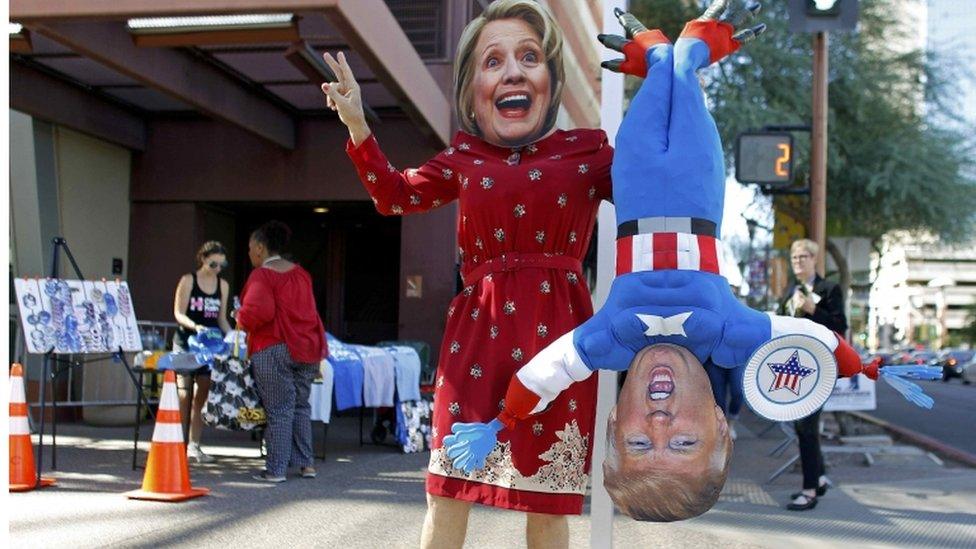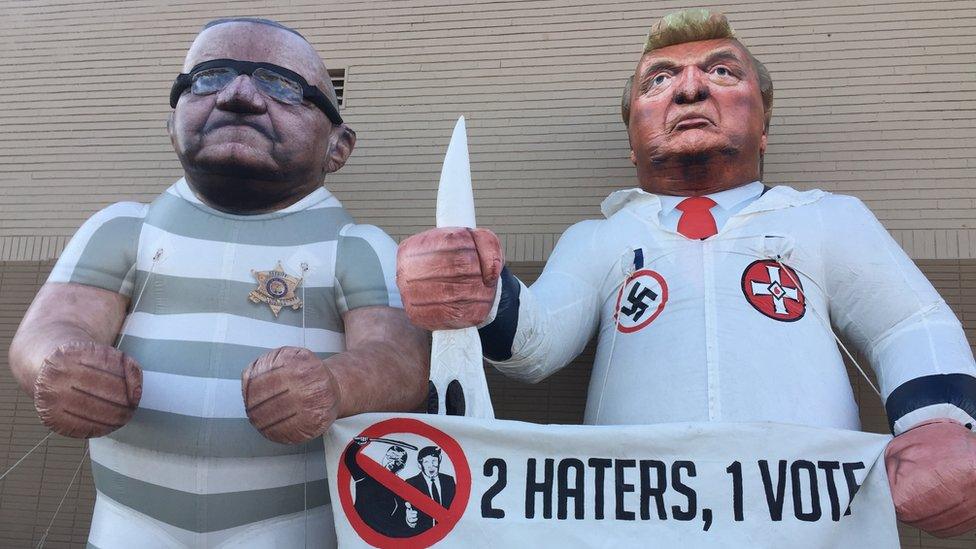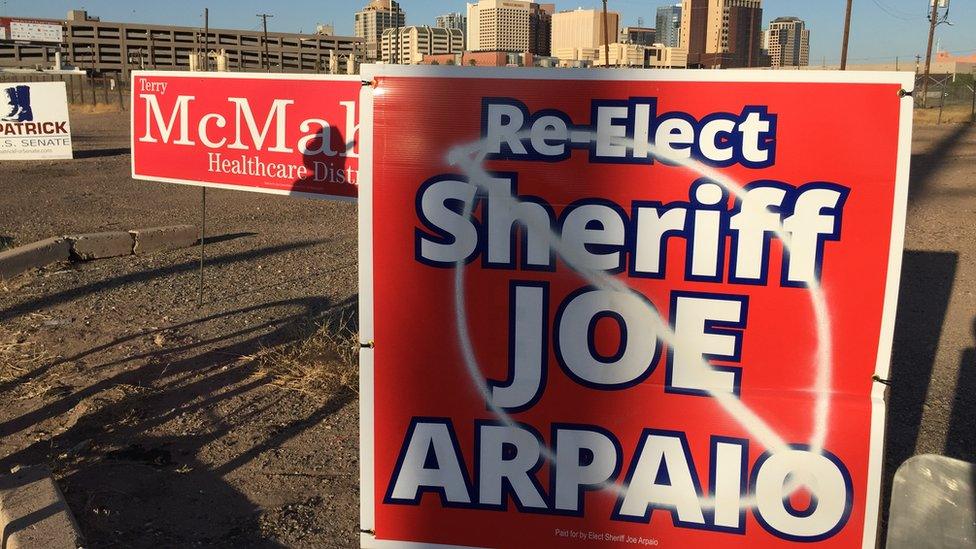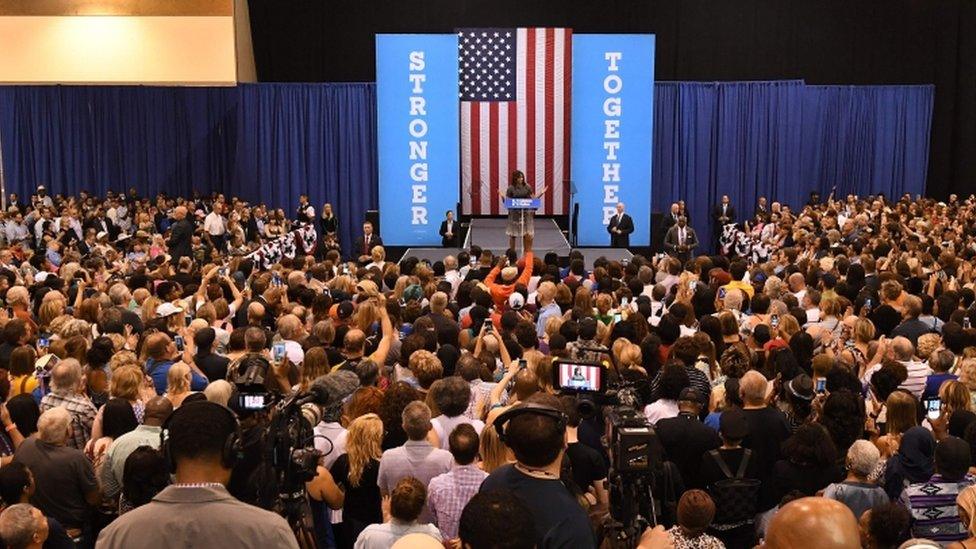US election 2016: Hillary Clinton's bid for Republican stronghold
- Published

If Clinton wins in Arizona, it will be a major reversal for Trump in a state that has long been a Republican stronghold
If Hillary Clinton is going to break through the narrow electoral map that has dominated the US presidential landscape for 16 years, some traditionally conservative states are going to have tilt her way.
If she is going to not just edge past Donald Trump but win in a rout, states like Arizona will have to fall into her column.
The home of the Grand Canyon last went Democratic in 1996, when Bill Clinton carried it.
Before that? Harry S Truman in 1948.
The state has a Republican governor and two Republican senators. Going into this election, it had a solid conservative red hue. Now, however, polls indicate Arizona and its 11 electoral votes (out of 270 needed to win the presidency) aren't just in play, they may be leaning toward Mrs Clinton.
A recent opinion poll , externalhas the Democrat up 5% - and others have her with narrow leads or within the margin of error.
Polls aren't just the only indicator of shifting winds in the desert, however. Voter registration is up big among Democrats, particularly with the state's growing Hispanic population. In Maricopa County, which contains Phoenix, the state's largest city, Democratic activist groups claim more than 150,000 new voters added to the rolls.
Former Arizona Governor Jan Brewer has downplayed these numbers, telling the Boston Globe , externalthat they constitute "wishful thinking" because Hispanics "don't get out to vote".
According to Arizona State University political science Professor Richard Herrera, external, however, there's reason to think a surge in voter registration will lead to higher turnout.
"Studies have shown that first-time voters as a result of new registration do tend to vote," he says. "Arizona is definitely a battleground state in 2016."
Clinton's not-so-secret weapon in Arizona: Michelle Obama
The Clinton campaign certainly believes the numbers are real - and is shifting resources accordingly.
It recently announced it would spend $2m on advertising and get-out-the-vote efforts in the state. Last week, it sent a slew of its top surrogates to help rally party faithful who have long been toward the back of the line when it comes time for national help.
On Tuesday, former presidential candidate Bernie Sanders visited. On Wednesday, it was Chelsea Clinton. Thursday, a truly big gun arrived - First Lady Michelle Obama.
Fresh off her full-throated denunciation of Mr Trump at a speech in New Hampshire the prior week, Mrs Obama drew a crowd of about 7,000 at the downtown Phoenix convention centre.
Introducing the presidential spouse, Arizona Congressman Ruben Gallego spoke of the "darkest of times" his state's Democrats endured during their years as a decided minority - and promised that these times were changing.
When Mrs Obama took the stage, she said that victory was within reach.
"Arizona is going blue," she said to raucous cheers.
Among the loyal Democrats in the crowd, the attitude was one of excitement and optimism - unfamiliar emotions for many.
"It's about damn time," said Linda Mills, who pulled her 16-year-old daughter out of high school to see the first lady. "I think it's incredibly important for us to live in a community that believes in diversity and respect and equal rights."
Mary DeCot, an Arizona resident for more than 40 years, says she's spending every waking hour volunteering for her party.
"I'm beyond excited," she said. "It's the start of a wave."
'Great week in Arizona'
A wave, however, means more than just a one-time victory at the presidential level; it means wins up and down the ballot. And it's here that the influx of time and money from the Clinton campaign could be a particularly welcome development for the state's Democrats.
Representative Ann Kirkpatrick, who is challenging long-time Arizona senator and 2008 Republican presidential nominee John McCain, says she was thrilled to hear that money and big-name Democratic figures were heading to her state.
"I think it shows that Arizona is on the edge of doing something great," she said. "This has been a great week in Arizona."
Although Mr McCain has had his struggles - he drew ire from some conservatives when he recently unendorsed Mr Trump - he continues to hold a double-digit lead over Ms Kirkpatrick.

That's not the case with another notable figure in Arizona Republican politics, however.
Joe Arpaio, the six-term sheriff of Maricopa County, has been a lightning rod of controversy due to his hardline anti-illegal-immigration stance and fiery rhetoric.
He was an early backer of Mr Trump, whom he has called a "political soulmate", and has spoken at numerous Trump rallies and at the Republican National Convention.
He supports aggressive tactics to identify and detain undocumented migrants in his jurisdiction, questions President Barack Obama's US birth certificate and has refused to obey a court order to halt his controversial immigration patrols, prompting a federal judge to recommend he be charged with criminal contempt.
Now, polls show him trailing his Democratic opponent by a large margin.
On Saturday morning, several hundred Hispanic activists and union members gathered at a local union hall, which featured giant inflatable caricatures of Mr Trump in robes of the white supremacist Ku Klux Klan and Mr Arpiao in prison garb.
"Two haters, one vote," read the banner hung across them.
As they prepared to fan out across the city's Spanish-speaking neighbourhoods to identify voters and help them cast their mail-in ballots, they said they sensed that victory over both Mr Arpaio and Mr Trump was at hand.

Rene Martinez, a member of an electrical workers' union near Sacramento, California, had travelled to Arizona to help with voter turnout in the month before the election. It's the first time his union has ever paid attention to Arizona politics.
Felipe Rodriguez, one of several dozen members of a University of New Mexico student group, was visiting Arizona just for the weekend to help with the voter canvassing drive.
"There are a lot of Arizona transplants in New Mexico," Martinez said. "They left because they were scared of what Arpaio was doing and they haven't been back since."
Now, however, Mr Arpaio may be on the ropes - and, according to Vira Diana, an undocumented migrant from Mexico who gained US residency through marriage, Mr Trump is unwittingly helping to pull him down.
"Trump's hatred brought a fire that hadn't been there before," the director of the Center for Neighborhood Leadership, external, which helped organise the anti-Arpaio event, said. "People wanted to register just so they could vote against him. People wanted to become citizens just so they could vote against him."

Michelle Obama's visit gave the Democratic campaign in Arizona a significant boost
Even in the conservative bastion of Mesa, Arizona, about 20 miles (30km) from where Mrs Obama spoke but light years away politically, Mr Trump's support often appears leavened with concern.
Many of those walking Main Street were less than enthusiastic about the prospect of their state balancing on the knife-edge in November. Some said they were shocked by the lack of support Mr Trump was receiving from his own party. Others put the blame squarely on the Republican nominee.
"I think it's sad," said Pam Woodbury, a math teacher at local public school. She views Mr Trump - and primary voters who supported him - as the ones responsible if the state moves toward the Democratic column.
Trump supporters: 'He's the only guy that will defend us'
Lucille Anglin, a senior at Northern Arizona University, is less pessimistic. She said the controversy surrounding Mr Trump is being overblown - a result of a Clinton-organised smear campaign. She adds that although the polls show the presidential race in Arizona close, there may be more Trump voters out there than are being reported.
"I feel like people don't want to admit that they like Trump, but I think when you go to the balloting you're going to see a lot of Trump lovers," she says.
Anglin could be right - the polls may be wrong in Arizona. If those surveys are correct, however, it may be the start of a Democratic trend that doesn't just put the state in play in a Clinton 2016 rout scenario, it makes Arizona a legitimate swing state in coming elections.
"The demographics in the state are continuing to change," says Professor Herrera. "If there is another increase in Latino voters, which there almost certainly will be, followed with an increase in party registrants, this could become a real battleground in future elections."
For Democrats, that's a dream scenario, giving them new and plentiful paths to electoral success.
For Republicans, it could mean the start of a long-term political nightmare.